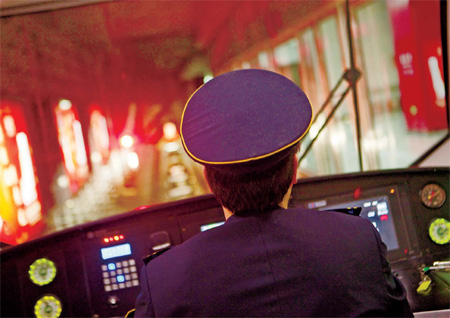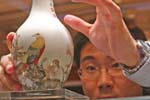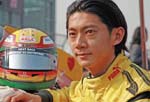Society
Expanding subways ease crowded roads
Updated: 2011-04-10 07:30
By David Cohen (China Daily)
China's growing urban congestion has prompted plans for newer and longer metro lines to ease the crowded roads. But the trains bring more than just commuting convenience. Often, they bring about a change of lifestyle, as David Cohen finds out.
 |
|
A subway train driver conducts a trial run along line 15 in Beijing in December 2010. The opening of five new lines, including Line 15, has brought the total reach of the city's subway network to 336 kilometers. [Photo/China Daily] |
People in the town of Nanshao are excited. The rural community, surrounded by farmland and unpaved roads and only 25 kilometers north of the second ring road, is one of the newest additions to Beijing's subway network. The residents believe that with the new train station will come economic development that will change the small township into a busy suburban community. Locals predict that workers from Beijing will take advantage of the new metro line to escape the city, bringing money to the community, whose largest employer is currently a small window factory. Zhao, a taxi driver waiting near the station, predicts that his life would improve as people move to Nanshao to flee the pollution and congestion of the capital. "Once the seventh ring road opens, it's going to get even better," he says. The market evidently agrees with his assessment. The two-street town is already bordered by construction sites and the skeletons of new high-rises, and locals say the price of an apartment has risen from the tens of thousands to millions of yuan in just two years. Nanshao's new subway station is the terminus of the new Changping Line, one of four new subway lines that opened early this year.
|
||||
Public transport is critical to the growth of Beijing, like all Chinese cities. Rising car ownership, and movement to suburban areas driven by rising house prices, has given Beijing some of the worst traffic in the world. A 2010 survey conducted by IBM rated Beijing's commute as the worst in the world, tied with Mexico City.
Traffic, planners say, is more than a waste of time for commuters.
Jiang Pingzhou, an expert in transportation policy working for a foreign NGO, explains.
"The underlying concern is not just that congestion is bad, because it costs people more time, but that it causes bad air, which is a bigger issue. So even the driver stuck in traffic isn't paying the full cost of congestion."
Despite the scale and speed of construction on a system that has opened an average of two lines a year since 2007, transportation experts say the city faces enormous challenges coping with its growing population.
Li Meng, an associate professor of transportation planning at Tsinghua University who works with the city of Beijing on traffic issues, says Beijing's transport system is simply not catching up with the public need. "Even though we're growing fast, we're still behind," he says.
For many planners, tackling Beijing's congestion will take more than building a better subway. Li says the underlying problem was the concentration of government, universities, and companies in Beijing's relatively small historic core.
Beijingers, he said, must travel farther each day than their counterparts in other major cities, such as New York and Tokyo, making painful commutes all but inevitable. A commuter living at Nanshao, at the end of the new Changping line, for example, would need over an hour just to get on board Line 2, the circular line that circumnavigates the city center.
Long trips are also making it harder for Beijing commuters to use bicycles, once the main form of transport in most Chinese cities. Zhou says bicycles and bicycle lanes were being crowded out by the proliferation of private cars, which more than doubled in Beijing during the past 10 years.
"In Europe," he says, "the bicycle is coming back, but in China, we are losing bicycles, especially in the last decade. We are losing bicycles lanes."
Li says that the subway system now serves less than half of Beijing's residents. In recent studies, his department found that half of all trips in Beijing are taken in private cars, making congestion worse than in larger cities, even those with more cars.
"Right now, Beijing doesn't have a very good public transport system. The number of cars in Tokyo is much higher than Beijing, eight million as opposed to five, but in Tokyo, 90 percent of commuters take public transit."
Experts are more optimistic and confident that Beijing can eventually "build out" of its current crisis, using a combination of new approaches to transportation now being tried in cities around China, and, changes to the way space is used in Beijing.
But, Li says, the process will be difficult and slow.
Specials

Share your China stories!
Foreign readers are invited to share your China stories.

Art auctions
China accounted for 33% of global fine art sales.

Waiting for drivers' seat
Lack of sponsorship appears to be why Chinese drivers have yet to race in a Formula 1 event



